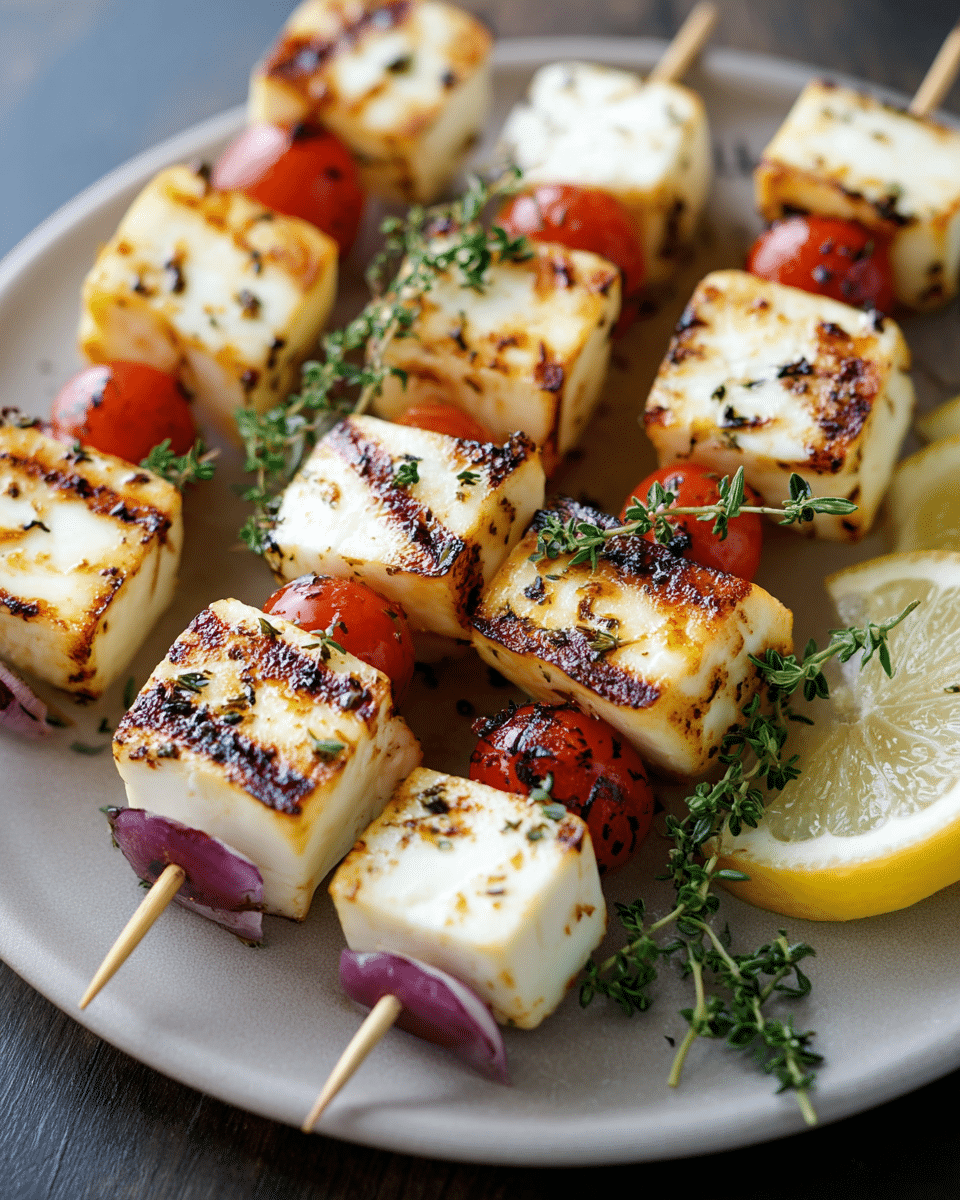These Grilled Halloumi Skewers are the epitome of simple sophistication. Featuring hearty cubes of halloumi cheese marinated in lemon, olive oil, garlic, and thyme, each skewer brings out the tangy richness of the Mediterranean. Grilled to golden brown perfection, the cheese develops a beautiful crust while maintaining its signature chewiness. Paired with juicy cherry tomatoes, zingy lemon slices, and sweet red onions, it’s a symphony of flavor and texture.
Ideal for summer cookouts, light lunches, or an eye-catching party appetizer, these skewers are a breeze to make but taste gourmet. Serve with a drizzle of olive oil and a sprinkle of red pepper flakes for a little heat, or dip in creamy tzatziki for a cooling contrast. Whether you’re vegetarian or just cheese-curious, this dish is sure to become a seasonal favorite.
Full Recipe:
Ingredients:
For the Skewers:
-
1 block (8–10 oz) halloumi cheese, cut into 1-inch cubes
-
1 lemon, sliced thin or into wedges
-
1 medium red onion, chopped into large chunks (optional)
-
1 cup cherry tomatoes
For the Marinade:
-
3 tablespoons olive oil
-
2 tablespoons freshly squeezed lemon juice
-
1 tablespoon fresh thyme (or 1 teaspoon dried thyme)
-
2 cloves garlic, minced
-
1 teaspoon honey
-
Salt and black pepper, to taste
Optional Garnishes:
-
Fresh thyme sprigs
-
Crushed red pepper flakes
-
Drizzle of extra virgin olive oil
Directions:
-
Cut halloumi into uniform cubes and pat dry with a paper towel to remove moisture.
-
In a small bowl, whisk together olive oil, lemon juice, thyme, garlic, honey, salt, and pepper to create the marinade.
-
Gently toss halloumi cubes in the marinade. Let marinate for at least 10 minutes.
-
If using wooden skewers, soak them in water for 15–20 minutes to prevent burning.
-
Assemble skewers by alternating halloumi cubes, lemon slices, cherry tomatoes, and red onion pieces.
-
Brush any remaining marinade over the skewers.
-
Preheat grill or grill pan to medium-high heat and lightly oil the grates.
-
Grill skewers for 2–3 minutes per side until halloumi is golden and lightly charred.
-
Transfer skewers to a platter. Garnish with fresh thyme, olive oil, or red pepper flakes as desired.
Prep Time: 15 minutes | Cooking Time: 10 minutes | Total Time: 25 minutes
Kcal: 285 kcal | Servings: 4 servings
Grilled Halloumi Skewers with Lemon and Thyme: A Mediterranean Marvel of Simplicity and Flavor
Grilled Halloumi Skewers with Lemon and Thyme may seem like a straightforward dish at first glance, but their charm lies in the unique combination of ingredients, history, and versatility. In a world that increasingly favors recipes that are easy, bold in flavor, and adaptable for various diets, halloumi skewers fit perfectly into the modern culinary landscape.
Whether you’re a seasoned foodie or a home cook looking to impress guests, this recipe captures the essence of Mediterranean cuisine fresh, zesty, herbaceous, and delightfully satisfying.
The History and Allure of Halloumi
Halloumi is a semi-hard, unripened cheese traditionally made from a mixture of goat’s and sheep’s milk, though cow’s milk is often used in modern commercial versions. It hails from the island of Cyprus and has been a staple of Mediterranean diets for centuries. Its high melting point is what truly sets it apart; unlike most cheeses, it doesn’t melt into a gooey puddle when exposed to heat. Instead, it forms a beautiful golden crust, making it ideal for grilling or pan-frying.
Traditionally enjoyed as part of mezze platters or breakfast spreads in Cypriot, Greek, and Middle Eastern cuisine, halloumi has gained widespread popularity around the globe. Its firm, chewy texture and naturally salty taste make it a favorite for both vegetarians and meat-eaters alike. In fact, it’s often dubbed “the meat of the vegetarian world” because of how well it holds up in savory applications.
Flavor Profile: Salty, Tangy, and Herbaceous
What makes this particular preparation of halloumi special is its pairing with lemon and thyme. Lemon brings brightness and a touch of acidity, which cuts through the richness of the cheese and elevates its flavor. Thyme, a classic Mediterranean herb, adds earthy, floral notes that balance the tanginess of the lemon and the saltiness of the halloumi.
When grilled, these elements come together to create an unforgettable flavor experience. The exterior of the cheese caramelizes slightly, giving it a crispy, smoky finish, while the inside remains chewy and tender. Add in juicy cherry tomatoes, optional red onion chunks, and citrus slices, and you’ve got a dish that not only tastes amazing but looks stunning on the plate.
A Nutritional Perspective
One of the advantages of this dish is its relatively high nutritional value. Halloumi is a good source of protein, providing about 6-7 grams per ounce. It’s also rich in calcium and phosphorus, both essential for bone health. Though it’s higher in fat and sodium than many other cheeses, it fits well into a balanced diet when consumed in moderation.
The addition of lemon and fresh thyme enhances the dish without adding any calories, and if you choose to include tomatoes or onions, you’re incorporating a healthy dose of vitamins and antioxidants. Paired with a whole grain like quinoa or brown rice, these skewers make a nutritionally rounded vegetarian meal.
Moreover, for those following a gluten-free lifestyle, this recipe is entirely safe. It’s also suitable for those on low carb or Mediterranean style diets. Vegans, however, would need to opt for a plant-based cheese alternative with a similar grilling quality, such as extra firm marinated tofu.
When and How to Serve It
Grilled Halloumi Skewers with Lemon and Thyme are incredibly versatile in how they can be served. They make a perfect appetizer or side dish, but with the right accompaniments, they can be elevated to a main course. Here are a few ideas:
-
As a starter: Serve with a dipping sauce like tzatziki, hummus, or a lemony Greek yogurt dip.
-
On a platter: Combine with grilled vegetables, pita wedges, and a drizzle of pomegranate molasses or balsamic glaze for a show-stopping mezze platter.
-
Over a salad: Lay the skewers on a bed of arugula, cucumber, and olives, then top with a light vinaigrette.
-
In a grain bowl: Add grilled skewers to a quinoa or couscous bowl with herbs, nuts, and a squeeze of fresh lemon.
-
As a vegetarian main: Pair with roasted potatoes, sautéed greens, or even stuffed grape leaves for a Mediterranean feast.
The aesthetic appeal of these skewers also makes them ideal for dinner parties, al fresco meals, or summer barbecues. Their vibrant colors and simple yet bold presentation make them Instagram-worthy every time.
Regional Variations and Creative Twists
Part of what makes this recipe so exciting is its adaptability. If you want to stick with the Mediterranean theme but change things up, consider the following variations:
-
Spicy kick: Add chili flakes or smoked paprika to the marinade.
-
Sweet and savory: Drizzle with honey or pomegranate syrup after grilling for a sweet contrast.
-
Herb switch: Use rosemary or oregano instead of thyme for a different herbal profile.
-
Citrus twist: Substitute lemon with orange or lime for a zesty flavor shift.
-
Add more veggies: Bell peppers, zucchini, and mushrooms all grill beautifully and add both nutrition and color.
And if you’re catering to non-vegetarians, you can easily add marinated shrimp or chicken to the skewers without altering the overall theme of the dish.
A Sustainable and Ethical Choice
Opting for vegetarian dishes like halloumi skewers is also a step toward more sustainable eating. Cheese production generally has a lower carbon footprint than meat, especially red meat. Additionally, halloumi often comes from small, local producers in Cyprus and other Mediterranean regions, supporting traditional farming practices.
For those concerned about animal welfare or environmental impact, you can look for halloumi brands that carry ethical certifications, or even explore artisan made, plant-based alternatives that mimic the grilling qualities of halloumi.
The Social Side of Skewers
From backyard barbecues to elegant plated meals, grilled skewers are inherently social. They encourage sharing, conversation, and informality at the table. This recipe, with its interactive skewering and vibrant visual appeal, fits beautifully into that communal tradition.
Whether you’re entertaining guests or making a quick meal for the family, these skewers offer an experience that goes beyond flavor they’re a celebration of seasonal ingredients, simplicity, and time spent together.
Conclusion:
Grilled Halloumi Skewers with Lemon and Thyme are a perfect representation of everything we love about Mediterranean cuisine fresh herbs, simple ingredients, bold flavors, and healthful balance. They come together quickly, require minimal prep, and offer maximum reward in both flavor and presentation.
From nutrition and taste to versatility and cultural authenticity, this dish checks all the boxes. It’s no wonder these skewers are becoming a go to for vegetarians and grill enthusiasts alike.
So whether you’re firing up the barbecue, looking for a new vegetarian recipe, or planning your next dinner party, keep these halloumi skewers in your culinary toolkit. They’re easy to make, impressive to serve, and unforgettable to eat.






